While the choice to split Mockingjay, the final Hunger Games book, into two movies was clearly a move to make more money (ala Harry Potter and The Hobbit), the real question was always going to be whether or not Mockingjay had enough material to create two films. Interestingly, the filmmakers seem to have pulled it off with very little effort—simply by focusing on the fire that stokes a rebellion.
Minor spoilers for the film below.
Mockingjay concerns itself primarily with Katniss’ transformation into the Mockingjay propaganda figure for the war District 13 is hoping to wage on the Capitol. This is only used to frame the opening of war, and to introduce viewers to District 13. The more militant aspects of their way of life are perhaps not explored as thoroughly as they could have been, but that’s not really what this story is aiming to focus on—instead, it’s all about the game the Capitol plays, using Peeta as a response to Katniss’ every move as the Mockingjay. Jennifer Lawrence is raw as ever, giving over another arresting performance with no evidence that she remembers she’s acting a part at all.
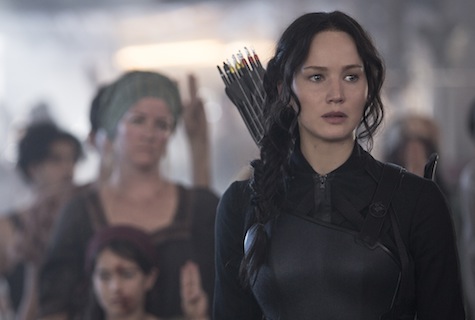
Fans of the book will notice certain elements are missing in this story perhaps more than in the previous two films; we spend less time dealing with Katniss’ PTSD and the fallout from it immediately following the Quarter Quell, and we don’t get as much of a window into Gale’s change from rebel into militant yes man. Though it was always likely—since they had very limited roles in the previous movies—the capture and use of Katniss’ prep team from the games is not part of the story either, which is honestly a shame. It prevents certain gray areas of the Hunger Games arc from coming clear, depicting war doing what it does best—destroying both sides as viscerally as possible. Effie’s presence is treated more as comic relief, but that’s not a point of irritation, since the movie desperately requires reprieves where laughter is possible.
Fans likely recall that Philip Seymour Hoffman passed away this year, and the film is dedicated to him. He seems to have shot the majority of Plutarch Heavensbee’s role nevertheless, and is present through the majority of the movie, selling Katniss to District 13’s President Coin the way one would sell a sports star to an athletic equipment company. The filming of the propos (that’s propaganda films) is where the core of the film is focused, and it manages those scenes to tortured effect every single time. Having Natalie Dormer present as Cressida, the director of these little specials, makes for an immersive experience. Her voice is in Katniss’ ear the whole time (and therefore in the audience’s ear as well), urging her to share the emotions she has such difficulty expressing.
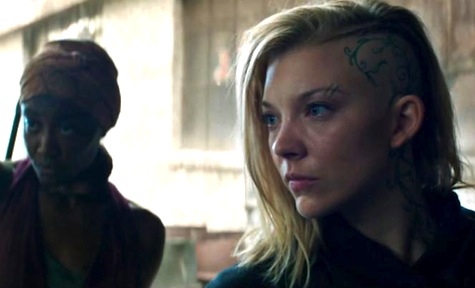
It works to stoke the audience’s expectations with the rest of Panem—confrontation rises alongside the audience’s outrage at what Katniss witnesses. Though some may be irritated at the choice to zero in on this aspect of the story, I’d argue that it makes for a compelling experience on screen. The Hunger Games films are in a better place to engage with how visual media manipulates people because that is what these films themselves are doing. This is an area where these films have the ability to be the most effective at exploring their text because they can do what the book cannot; they can show us what it looks—what it feels like—to be rallied into a frenzy over the sight of a hero shouting down an impossible giant.
Essentially, the opening of the book has been put under a microscope, and that close focus provides a unique opportunity to examine power dynamics. We can see the difference in how Katniss is framed, versus how Peeta gets framed by the Capital, and that is extended to how President Snow is juxtaposed against President Coin (and they are similar enough in their rhetoric and devices to make even the most unobservant viewer wince). The use of music is employed to chilling effect, moving from a simple song Katniss is prompted into to singing by a river (called “The Hanging Tree”) to its use in propaganda to how that provokes a reaction among Panem citizens. You will never get that song out of your head, and that is precisely the point the movie is making.
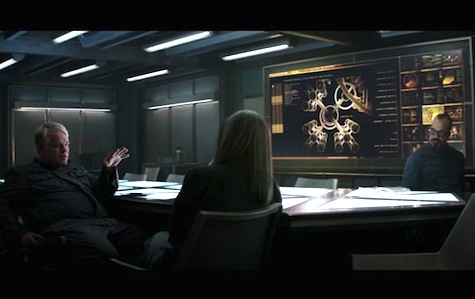
These films are at their best when they’re working with small touches, and yet again, this is where they shine. President Snow’s daughter silently pulling the Mockingjay braid from her hair when she learns it is no longer acceptable to support Katniss: Finnick’s repetitive knot-tying as he attempts to keep calm, Peeta’s wardrobe choices, which first make him appear as though he has a dagger to his throat, then later look as though they’re choking him. We do miss out on seeing more of the Capitol this time around, though that will likely be remedies in the next film.
Julianne Moore gives a no-bones-about-it performance of President Coin, and her subtlety plays well next to Katniss’ hurt and rage. Because the theme of manipulation is front and center on this outing, very few characters seem safe outside of Prim and Gale. Haymitch is perhaps a bit underused, and one does have to wonder if President Snow hasn’t become a little too on-the-nose in terms of scenery-chewing, but Donald Sutherland still appears to have enjoyed himself. The violence in the film is some of the most visceral we’ve seen thus far, and that’s saying something. It comes to the forefront right at the end, and makes the placement of the film’s ending work better than it might have otherwise.
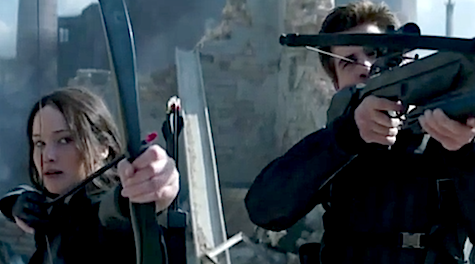
The next film will demand a lot less pondering and a lot more movement, so we’ll see what Part II brings and how this movie nestles in with the other three. In the meantime, beware: Fire is catching.
Emmet Asher-Perrin could use a drink (wth Haymitch) now, if you please. You can bug her on Twitter and Tumblr read more of her work here and elsewhere.










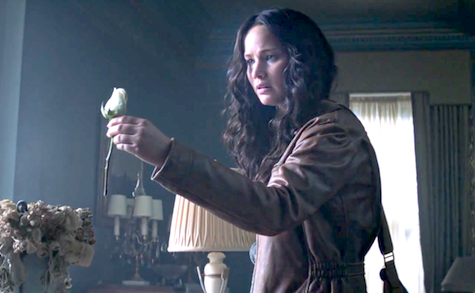
I feel bad there are no comments yet! I didn’t really want to get into reading this though, as I haven’t seen the movie yet (though I’ve read the book, so it is probably not spoilery).
This is the first positive review of the Mockinjay I’ve seen and it makes me so happy. It seems like every other review I read was complaining that there was no actual “Hunger Games” in this one and so it sucked. Apparently those reviewers felt that if they didn’t get to see kids attacking and killing each other, then their time was wasted. Says a lot more about the reviewers than the film, if you ask me.
Anyways, it was great to see someone watch the movie that actually enjoyed it and, even more so, understood it. Thanks!
Thank you for this review!! As said in comment 3, it’s so nice to finally see a review that understands the point of the movie. I have to wonder how all those reviewers going “Ugh, there weren’t any cool action bits” so completely missed the point. I *loved* the way this movie focused on the two sides of war we don’t usually see in action movies–the political spin on one hand and the massive cost of lives on the other. (Also, thanks for the insight on The Hanging Tree. It’s been stuck in my head since I saw the movie, and I never realized “Oh. That’s the point.”)
I enjoyed the movie quite a bit. Having only read through the books once, a few years ago, I didn’t have the “this wasn’t in the book” hangups that my GF did, which I think helped.
Judged as a film itself, I was amazed how the director and editor managed to add so many different layers to what was going on. There was the major action events going on, there were the characters in the film who were watching and reacting to the action, and then there was the audience reaction to everything and it was all carefully controlled to ratchet up the tension at the end.
It still managed to make many of the author’s points I believe, but in a very different approach. Rather than watching everything from Katniss’ perspective and seeing her figure events out, I felt like more of a fly on the wall observer, which was good even though you miss out on some of the stuff from the book.
I would like to take a moment to disagree with the near-universal line that splitting a book into multiple movies is nothing but a ploy to make more money.
While there are other issues that vary on a case by case basis, the simple fact is books are longer than a movies. We have subsisted until quite recently on movie adaptations that remove most of the material from the source book, and I’m excited to see moving away from that.
I frankly consider the movie format to be too short for speculative fiction stories. It’s really hard to fit plot AND character development AND world-building into a movie people will watch in a single sitting. I’m very excited to see a new format developing, that combines the strengths of movies (high budget, tight scripting) and television serials (enough time for character development).
Finally had a chance to see this today. I thought it was pretty good and I actually think I liked it a little better than the book in some ways. They cut some of the day-to-day details of District 13 but it’s a movie, so I think they kept the pace moving really well.
The only thing I was really disappointed in is they really downplayed Finnick’s propo. That was a really big deal for me in the book and I think they needed to spend time on it and really zero in and let it hit home and sink in for the audience. Instead, Katniss was just watching it on a screen and they kept cutting to other parts and bowled right through it.
And Emily, I think you mean Snow’s granddaughter.
I really enjoyed it – Mockingjay was my favorite of the books, but I was a little worried at how the first half would translate into a movie, as I remember most of it being Katniss’s internal strugles, as well as getting acclimated to District 13 – but I think they did a good job with the pacing, while still showing the strain Katniss was under. I also think using Effie instead of the prep team was a good choice in terms of keeping the plot tighter for the film media (also, I kinda want to ship Effie/Haymitch, lol).
In addition to what crzydroid mentions above, the one thing I do think was different was that I remember having a lot of red flags go up regarding Gale, Coin and District 13 even at this point in the book, wheras I don’t think I would have picked them up in the movie. Coin seems a lot more personable than I envisioned her, and so I wonder if the last movie will take things to the darker place they end up going, especially with Coin’s (and Gale’s) possible involvement in them. But since the next movie will start with the Nut invasion, that may be a good place to start sowing those seeds.
So sad we didn’t get to see more Johanna! I hope there’s lots of her in the next one!
Meta moment: One of the trailers before the movie was for the latest Night at the Museum movie, which starts out with them watching laser pointer cat videos – which made me think of Buttercup. So, when that part of the movie came on there were others snickering in the audience about making a cat video propo ;)
It was also a little sad/eerie seeing Robin Williams in the trailer, and then Hoffman in the movie.
Double post, sorry.
I just now remembered this thread and came back to it.
Count me in the group that liked it. As with Lisa, Mockingjay is my favorite of the 3 books and I was curious to see how they’d handle Katniss’ mental struggles. It’s hard to do (Buffy S6?), but I think they did pretty well. I have some criticisms along the same lines as 6 and 10, but we can’t have everything.
Speaking of which, and to follow up on 8, I’d really like to have seen the Trilogy done by HBO GoT-style. Not that HBO has been perfect, by any means, but the extended format allows for a lot more of the books and a single movie or even two.